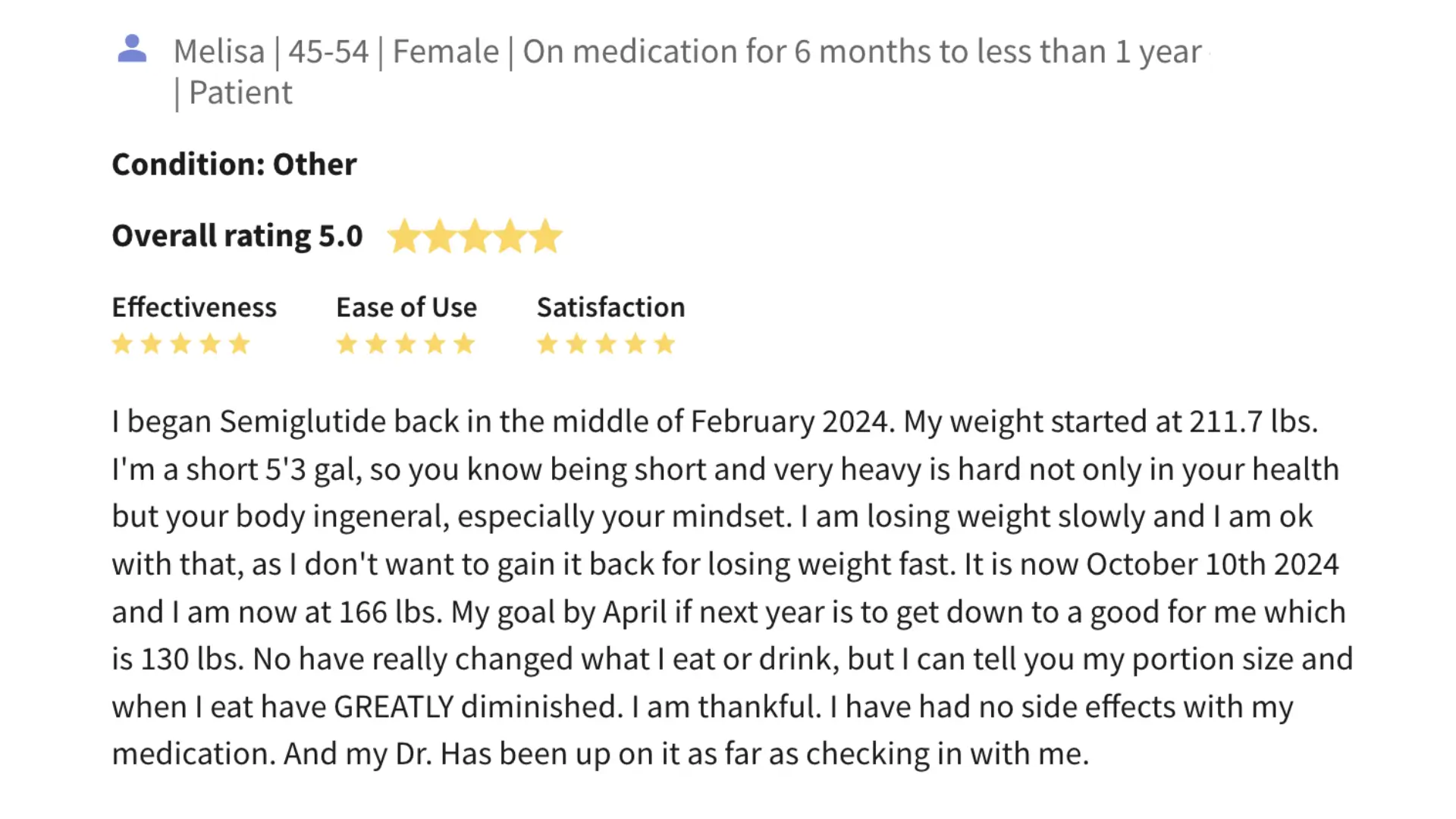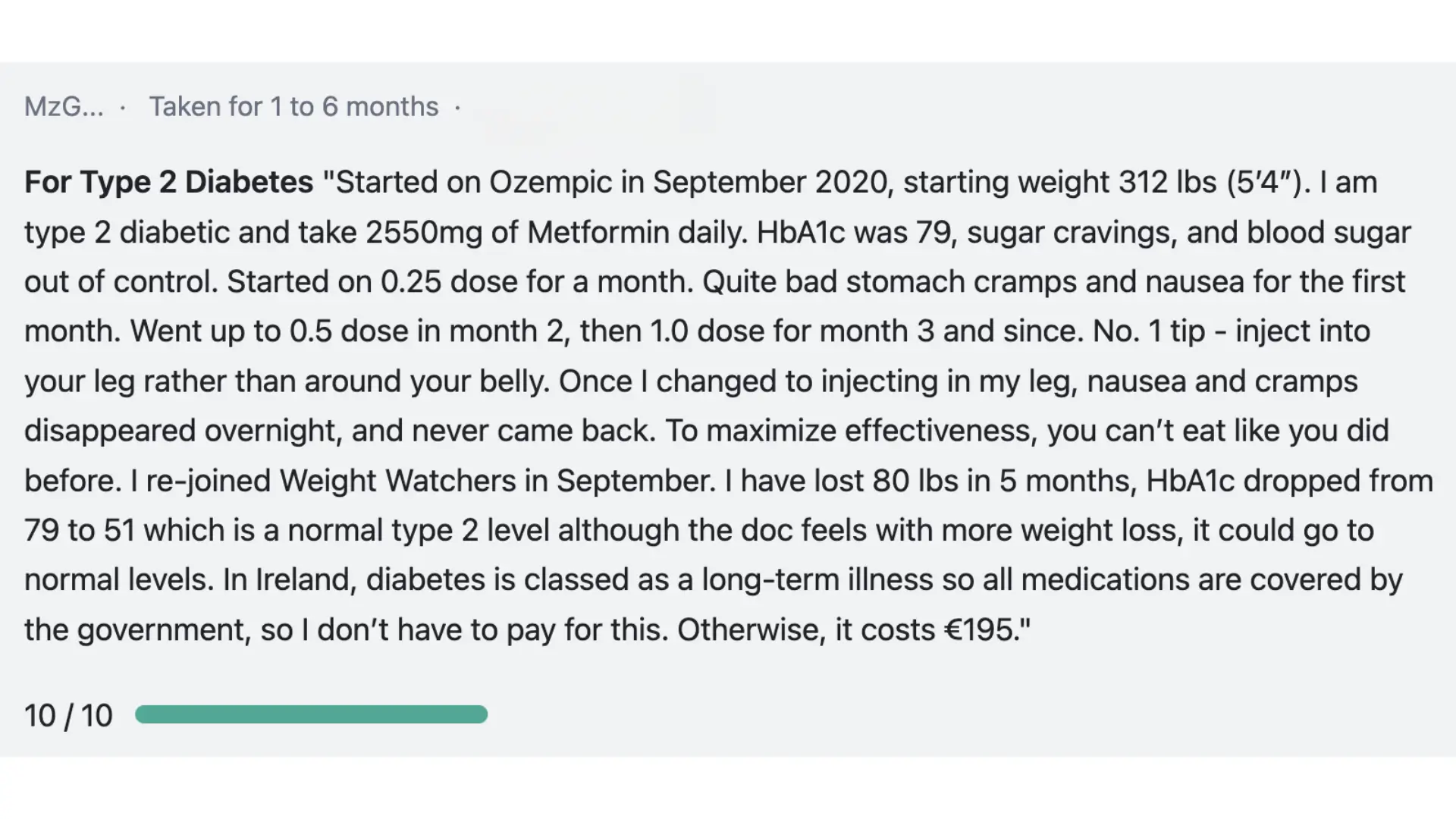Ozempic (semaglutide) has become one of the most talked-about treatments in modern diabetes and metabolic care — and for good reason. Beyond improving blood sugar levels in people with type 2 diabetes, it also supports weight management and helps reduce cardiovascular risks, offering patients and clinicians a more comprehensive approach to long-term health.
A 2022 systematic review found that once-weekly semaglutide 1 mg significantly improved glycemic control, lowering HbA1c by about 1.7 percentage points compared with placebo, while also reducing fasting glucose. These results illustrate why GLP-1 receptor agonists, the class to which semaglutide belongs, have become a cornerstone of diabetes management and preventive cardiometabolic therapy.
In this article, we’ll explore the full range of Ozempic’s benefits, explain how it works in the body, compare its available formulations, and highlight important safety and prescribing considerations for both patients and healthcare professionals.
Key Takeaways
- Ozempic (semaglutide) is a once-weekly injectable medication approved for type 2 diabetes, helping improve blood sugar control and reduce cardiovascular and kidney risks.
- Patients often experience secondary weight loss benefits, while Wegovy (a higher-dose semaglutide formulation) is explicitly approved for chronic weight management.
- The SUSTAIN clinical trials confirmed that Ozempic significantly reduces HbA1c and fasting glucose when combined with diet and exercise.
- Findings from the FLOW trial (2024) show that semaglutide also helps slow kidney disease progression and reduce end-stage kidney failure risk.
- Patients report enhanced appetite control, improved lifestyle habits, and easier adherence thanks to the once-weekly injection schedule.
- Consultation with a healthcare provider remains essential to personalize treatment, manage side effects, and optimize long-term health outcomes.
About: Medica Depot is your trusted all-in-one supplier, offering a range of high-quality medical injectables and supplies. If you’re looking to buy Ozempic, contact Medica Depot’s sales representatives and they will guide you on how to do so. Whether for health professionals, plastic surgeons, dermatologists, licensed estheticians, or other specialists, we can offer genuine, brand-name products you may need. With Medica Depot, we prioritize serving you better to improve the patient’s quality of life.
Glycemic Control and Diabetes Outcomes With Ozempic

Individuals with type 2 diabetes often seek reliable treatments that fit into their daily lives while improving long-term health outcomes. The U.S. FDA has approved Ozempic (semaglutide), developed by Novo Nordisk, as a once-weekly injectable prescription medication for adults with type 2 diabetes. It is most effective when used alongside a balanced diet and regular exercise.
Ozempic stimulates insulin release when blood glucose levels are high and suppresses excessive glucagon secretion, which helps maintain stable glucose levels. The SUSTAIN clinical trials have confirmed its safety and efficacy, showing consistent reductions in HbA1c and fasting plasma glucose when added to standard diabetes therapy.
For patients considering semaglutide as part of their diabetes management, consultation with a healthcare provider is essential. A thorough evaluation helps determine whether Ozempic is appropriate and allows providers to discuss dosing, side effects, and expected outcomes—supporting both safety and patient confidence.
Weight Loss and Metabolic Benefits of Ozempic
Many patients managing type 2 diabetes are also concerned about their weight and metabolic health. Healthcare professionals may discuss Saxenda vs Ozempic, as both medications come from Novo Nordisk but serve different purposes. Saxenda (liraglutide) is approved for chronic weight management, while Ozempic is approved for type 2 diabetes, with weight loss considered a beneficial secondary effect.
Clinical evidence shows that Ozempic promotes dose-dependent weight loss when combined with lifestyle changes. However, in non-diabetic populations, the greater reductions in body weight were demonstrated with 2.4 mg semaglutide (Wegovy).
Studies have shown meaningful reductions in body weight, BMI, and waist circumference, linked to semaglutide’s mechanism of action: appetite suppression, slowed gastric emptying, and increased feelings of fullness. Healthcare providers should individualize dosing, titration, and monitoring, ensuring patients understand their treatment goals and potential side effects.
Cardiovascular Disease and Renal Protection From Ozempic
Beyond blood sugar and weight management, Ozempic has demonstrated significant cardiovascular and renal benefits. Large outcome trials show that semaglutide reduces the risk of major adverse cardiovascular events—including heart attack, stroke, and cardiovascular death—in adults with type 2 diabetes and established cardiovascular disease.
Recent results from the FLOW trial (2024) further revealed that semaglutide can help slow kidney disease progression and reduce the risk of end-stage kidney disease in patients with type 2 diabetes and chronic kidney disease. These findings highlight drug-specific and class-related benefits that distinguish semaglutide among GLP-1 receptor agonists.
Such outcomes reinforce Ozempic’s value for clinicians aiming to achieve both glycemic control and cardiovascular protection in high-risk patients.
Patient-Reported Lifestyle and Adherence Benefits of Ozempic
Patients frequently report noticeable lifestyle improvements after starting Ozempic. Many describe better appetite control, reduced cravings, and increased motivation to make healthier choices. Some note renewed energy and a greater ability to maintain physical activity as their weight and blood sugar improve.


The once-weekly dosing schedule is one of Ozempic’s most appreciated advantages compared with daily injectables. Patients often find that fewer injections enhance adherence and fit better into their weekly routines. Healthcare providers should emphasize treatment adherence, discuss potential gastrointestinal side effects, and offer strategies to manage mild nausea or discomfort—symptoms that often resolve within days or weeks.
Early counseling, supportive follow-ups, and practical advice on diet and titration can help patients stay consistent with therapy and achieve long-term results.
Conclusion
Ozempic offers a comprehensive set of benefits for individuals with type 2 diabetes, extending beyond glucose control to include weight management, cardiovascular protection, and kidney preservation. Its once-weekly injection schedule promotes better adherence, while its appetite-regulating effects support healthier lifestyle habits.
Patients should partner closely with their healthcare providers to determine whether Ozempic aligns with their overall treatment goals. With proper guidance and adherence, this medication continues to redefine how clinicians and patients approach metabolic health.
FAQs
1. What are the main health benefits of using Ozempic for type 2 diabetes?
Ozempic helps lower blood glucose levels, promote weight loss, and reduce the risk of cardiovascular and kidney complications in adults with type 2 diabetes.
2. What is the clinical efficacy of Ozempic in managing type 2 diabetes?
Across SUSTAIN trials, Ozempic has shown average HbA1c reductions of up to 1.7 percentage points depending on the dose (0.5 mg–2.0 mg), along with improvements in fasting glucose levels and overall metabolic control.
3. Can Ozempic help with weight loss?
Yes. Although Ozempic is not primarily approved for weight management, many patients experience clinically meaningful weight loss as a secondary benefit. For patients focused solely on obesity treatment, Wegovy (semaglutide 2.4 mg) may be a more suitable option.
References
Zaazouee MS, Hamdallah A, Helmy SK, et al. Semaglutide for the treatment of type 2 Diabetes Mellitus: A systematic review and network meta-analysis of safety and efficacy outcomes. Diabetes & Metabolic Syndrome: Clinical Research & Reviews. 2022;16(6):102511. doi:https://doi.org/10.1016/j.dsx.2022.102511
Gao X, Hua X, Wang X, et al. Efficacy and safety of semaglutide on weight loss in obese or overweight patients without diabetes: A systematic review and meta-analysis of randomized controlled trials. Front Pharmacol. 2022;13:935823. Published 2022 Sep 14. doi:10.3389/fphar.2022.935823








